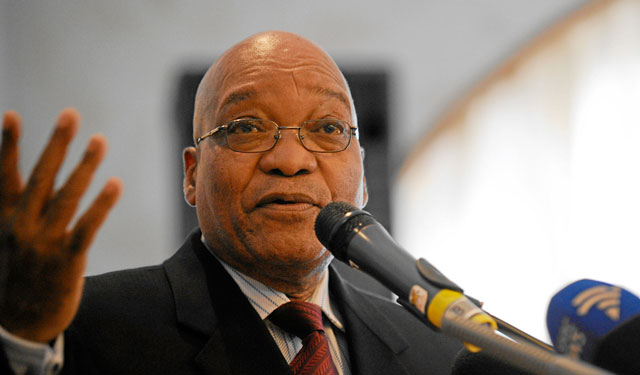
With his time as leader of the ANC running out, President Jacob Zuma is gambling that a raft of populist measures can bolster his grassroots support and ensure his political survival.
“Radical economic transformation” was the theme of Zuma’s annual state-of-the-nation address on Thursday delivered amid scenes of lawmakers brawling and security forces imposing an unprecedented lockdown outside Parliament.
Zuma repeated pledges by the ANC, which has held power since the end of apartheid in 1994, to use the state to boost the black majority’s wealth, speed up land reform and strengthen the government’s role in the mining industry.
“Time is running out for Zuma; time is running out for the ANC,” Tinyiko Maluleke, a political analyst at the University of Pretoria, said by phone on Friday. “That for me is at the heart of why you have ‘radical economic transformation’.”
This state-of-the-nation address was the first since the ANC suffered its worst electoral performance, when it lost control of Pretoria, the capital, and Johannesburg in an August municipal vote that saw its support fall to an all-time low of 54,5%, down 7,7 percentage points from the national vote three years ago. If the ANC took another hit of that magnitude in 2019, it would likely be relegated to the opposition.
While Zuma acknowledged in his speech that black voters “are dissatisfied with the economic gains from liberation”, he has little scope to do much about it. His term as the nation’s president runs out in 2019, and once he steps down as ANC leader at the party’s next congress in December as he’s promised to, he’ll have to answer to a ruling party that may no longer share his vision.
That makes the decision of who follows Zuma as ANC leader even more vital to the economic direction of South Africa. Zuma may also be relying on his successor to shield him from 783 graft charges that were dropped before he became president in 2009 and which the opposition is fighting to reinstate.
While the ANC has banned its members from openly discussing succession until later in the year, Zuma’s statement that the ANC is ready for a woman president was widely seen as an endorsement for former African Union Commission chairwoman Nkosazana Dlamini-Zuma, 68, who’s his ex-wife and the mother of four of his children.
Other leading contenders for the post include deputy President Cyril Ramaphosa, 64, who has been endorsed by the ANC’s labour union allies, and the party’s treasurer-general Zweli Mkhize, 61.
I have seen him come alive mainly when things have to do with his own survival as president of the ANC and the country. Maybe his survival has been his project and will remain his project for the rest of his term
“He is definitely a lame duck president at the moment on a strategic level,” said Andre Duvenhage, a politics professor at North West University in Potchefstroom. “He is not going to go without a fight. At the moment he is very dangerous.”
Zuma still has cards to play. He can reshuffle his cabinet and weed out ministers who defy him, as he threatened to do last month at a meeting of the ANC’s national executive committee, according to two leaders who attended the gathering in Johannesburg and declined to be identified because they’re not authorized to comment.
The opposition says the true target of any ministerial change may be finance minister Pravin Gordhan, with whom Zuma has feuded over the management of state companies and spending on a planned nuclear power program. Police are still investigating Gordhan over allegations that he set up an illegal spy unit when he ran the tax agency.
In his address to parliament, Zuma said a policy overhaul was essential because black South Africans directly own just 10% of the top 100 companies on the JSE and white households earn five times more than their black counterparts.
“There can be no sustainability in any economy if the majority is excluded,” he said. There needs to be “fundamental change in the structure, systems, institutions and patterns of ownership, management and control of the economy”.
Zuma’s legacy of scandals
While economic growth is expected to rise in 2017 from its weakest level in seven years, scandals are likely to go down as Zuma’s legacy. The nation’s top court found that he violated his oath of office by failing to repay state money spent on his private home, while the nation’s ombudsman implied in a report that he allowed members of a wealthy family who’re in business with his son to influence cabinet appointments and state contracts.
In November, the ANC’s national executive committee debated whether to remove him. The proposal was rejected, but the fact that it was even entertained illustrated his vulnerability.
Despite reading a long list of statistics and policy ideas in his speech, Zuma isn’t really interested in the nitty-gritty of government policies, Maluleke said.
“It doesn’t seem to me that those kinds of things keep him awake at night,” he said. “I have seen him come alive mainly when things have to do with his own survival as president of the ANC and the country. Maybe his survival has been his project and will remain his project for the rest of his term.” — (c) 2017 Bloomberg LP

